- Home
- William Kowalski
Eddie's Bastard Page 20
Eddie's Bastard Read online
Page 20
Digging rocks was a process that could go on for months. The plot of land he was working was about an acre, and at one end of it there was a pile of rocks three feet high, which Willie had already unearthed. When he was done digging up the garden, and his corn and vegetables were planted, he would use the rocks to add onto the knee-high wall that already partially encircled the Mann fields.
It was nearing noon. In a few minutes his mother would ring the iron triangle for dinner. Willie stabbed his shovel into the earth again and struck another rock. It was a big one. Sighing, he dug around it and dropped painfully to his knees. Then he began to scoop the loose soil out with his hands. He hoped the rock wasn’t so big that he would have to hitch up the horse and pull it out. That would add at least another hour to the work ahead of him, and he was hungry.
But as soon as he had finished scooping out the loose soil, Willie forgot all about dinner. He also forgot about hitching up the horse and about the pain in his leg. He focused his attention instead on the top of the iron-bound chest he had just uncovered, which lay just a bare six inches under the ground. He reached down and touched it—the rusted iron almost gone, the wood eaten away by damp and decay. The thing looked old.
Willie sat back on the ground and squinted up at the sky. He was not an excitable man. He needed to think for a moment. Far away, at the other end of the fields, his mother rang the dinner triangle. It was a shrill, nerve-jangling sound, one that usually never failed to send him limping eagerly off to the house. This time, however, Willie ignored it. He picked up his shovel again and dug around the sides of the chest carefully, so as not to rupture the fragile wood. He excavated the chest entirely, so that every inch of it lay exposed. It had large wrought-iron handles on either end. When he tugged on one of them it came off effortlessly in his hand.
“Well,” he said to himself. He sat at the edge of the hole for a while, twirling the ancient handle on one finger, contemplating this new turn of events. The chest had a lock on it, also badly eaten by corrosion, but on it was still visible the letter R, molded long ago by an English craftsman, if the legend was correct. Willie recognized it immediately. It gave him such a shock that he was only able to sit and blink stupidly for several moments.
He thought about the history of the chest, and of how strange it was that he should be the one to find it; and he reflected also on the unusual feeling he had of having been suddenly plunged over a century into the past. Willie reached into his jacket and plucked one or two chest hairs. Yes, it stung. He was not asleep then. He felt like a character in one of his own dreams. Best not just go rushing off into the next thing just yet, he thought. Chances are a thousand to one nothing like this will ever happen to me again.
“Well, well, well,” said Willie. Without a further thought about anything at all, he went to the pump and washed his hands and face in a bucket there. Then he went into the tiny house that he had shared all the years of his life, minus his four war years, with his mother, father, grandfather, and two brothers.
The rest of the Manns, except for Daddo, his grandfather, were already seated around the table in the middle of the tiny house. The house had only three rooms. There was the kitchen, which was the largest area and in which they also ate, sat, and read the Bible on Sundays. There was one bedroom for Willie’s parents, and another that Willie shared with his brothers and his grandfather. Willie slept head to toe with his brothers in one bed, while Daddo had his own cot. Daddo was not at the table. He ate in the bedroom, by order of Willie’s father, because he had no teeth and made too much noise when he ate.
The family was in the middle of praying over the food. Willie removed his hat and bowed his head until they were finished. Then he hung up his jacket and sat down in his chair. Nobody spoke. Willie’s mother got up again and began serving dinner. First she served Willie’s father, then Willie, then Andy, then Poky Boy. She put some mashed peas and potatoes on a plate and took it into Daddo, roaring at him what it was because he was mostly deaf and half-blind. Finally she served herself, sat down, and the family began eating.
“Finish that field, did ye?” said Father.
“No,” said Willie. “Won’t for ages.”
“Rocky, is it?”
“Aye. Same as the rest of this place.”
“Right, so.”
“Ham,” said Poky Boy. Mother got up and served him another ham steak.
“You’re not hungry, then?” said Andy to Willie. “Mind if I eat your steak?”
“Work away,” said Willie.
“And why are ye not hungry?” said his mother, alarmed. “Be ye sick?”
“Naw.”
“Ye must be, workin’ all mornin’ and not hungry!”
“Woman,” said Father sternly, “if he says he’s not sick, then he’s not sick.”
Mother fell silent and picked at her food.
“Excuse me,” said Willie. He got up and limped into the back room where Daddo ate. He could feel four pairs of eyes burning at the back of his head. Something was going on, they knew, but they also knew better than to ask him what it was. Willie had been very quiet since his return from the fighting. He’d been gone four years, and when he returned he barely spoke at all, not even to tell them the story of how he was wounded. War did that to a man, counseled Father. Best let him work it out on his own, and he’ll tell it when he’s ready. The Manns had been waiting for nearly a year now for Willie to start talking. So far, he showed no signs of it.
Willie sat down heavily on the floor at Daddo’s feet and tapped him on the knee so the old man would know he was there.
“Eh?” said the old man. “Who would that be?”
“Me, Willie!” shouted Willie.
“Willie!”
“Aye.”
“What is it, then?”
Willie paused, unsure of how to begin. Daddo was very old, old beyond counting, and Willie didn’t want to excite him. Daddo himself had no idea when he’d been born, but he had fought the English in the War of 1812, and had already been past his youth then. Daddo had come from Ireland. So had most of the other residents of Clare, which was the town just a few miles down the road. He still spoke with a thick Irish accent. His son, Willie’s father, also spoke with an accent, but not as thickly. Willie’s accent, like those of his brothers, was mostly American, with a touch of a drawn-out a or a rolled r here and there, even though they still spoke in the same lyrical Irish rhythm.
“You remember that story of the Rory treasure?” Willie said.
“Aye,” said Daddo. “Why d’ye ask?”
“Tell it,” said Willie.
“What! Now?”
“Aye.”
“Bejesus,” mumbled the old man. In the eating room, all sound had stopped. The family was straining to hear.
Daddo, like many old folks, was a wealth of stories. He had a reputation for being great entertainment at gatherings, and he was always invited to weddings and funerals and barnraisings, where he was given an honored place by the fire and someone was always sure to keep his glass full. He knew ancient stories from the old country, stories of the New World, stories of battles, ghosts, heinous crimes, horrible betrayals, of love affairs doomed from the start. His memory began centuries before his own birth, for the stories he told had been told to him as a little boy by his father, who’d learned them from his father, and so on; by the time Daddo heard them, they were already ancient legends.
But the story of the Rory treasure was a relatively new one. It had happened around the time of the War of Independence; had happened, in fact, probably close to the time Daddo himself was born in County Clare, across the sea. Everyone in Clare Town and other towns for miles around knew the tale well. They had been brought up with it, and all of them hoped that someday they would be the one to find the Rory treasure, because it was rumored to be a great one.
But few people Willie’s age believed in the Rory treasure. This was why he wanted to hear the story again. He had to make sure of every detail of it,
had to make sure he remembered it exactly as it was supposed to be told, because he knew this story was about to become very important to him. When he repeated it later in his life, he wanted to be sure he got it right, because up to this moment, Willie had never believed in the Rory treasure either.
“’Tis a strange time to be askin’ for stories,” said Daddo, “with the whole day ahead of ye and work to be done.”
“I have my reasons,” said Willie. He put his hand on Daddo’s knee again, this time warmly. “Tell it, please.”
Daddo put down his plate. When he recited, he drew himself up to his full height, but remained seated, as befitted his age and dignity. At gatherings, his clouded and useless eyes stared mistily over the heads of his listeners, except when he came to a frightening part, when he made a point of staring directly at the youngest children in the room, who would scream in terror. Daddo had a grand flair for the dramatic. He pulled out his pipe and filled it. Willie lit it for him with a match.
Daddo paused for a moment to collect his thoughts. When he told stories, it was as if he was reading from a script in his head. He never told a story the same way twice, but somehow it always came out with the same ending.
“There was once a Scottish clan by the name of Rory,” he began, his r’s and his vowels rolling roundly from his mouth. “They were among the first to settle in the Colonies, brought here, like the others, by the scent of money, which drifted across the Atlantic and tickled their freckled and greedy noses. They had a land grant from the governor of New Amsterdam, and half of their time and money went into farming there, with the benefit of free labor from Indian slaves. The other half of their money was invested in a different kind of slave. The Rorys owned a dozen or so ships, which loaded their hulls with stolen human beings, two-legged cargo taken from their homes deep in Africa and sold in African ports with names like Mozambique or the Ivory Coast. They shipped these slaves across the ocean and unloaded them in the Colonies.
“This brought them huge profits until the Colonies went to war against England. Then the English tried to press the Rory ships into naval service against the rebellion. The Rorys themselves cared nothing for the rebels, but being Scots, their hatred of the English overcame even their love of easy profits. They scuttled all their ships—one of them was still loaded with unsold slaves when they burned and sank it—so that the English couldn’t get their filthy hands on them. The English king was so furious he sent a detachment of specially trained mercenaries—Hessians, the bloodiest and most murderous bastards in all of Europe—to kill every Rory man, woman, and child, seize all their goods, and turn them over to the Crown.
“The story has it the Hessians began their work in Scotland, where many poorer relations of the New World Rorys still abided. They cut off the heads of seventeen Rory men, women, and children, put them in a barrel, and shipped it off to England. Within two weeks, every sailor on board that ship was struck blind. That was the beginning of the Rory curse. The tale spread across the world, via the shipping lanes. It was a proven fact that anyone who harmed a Rory would lose his sight. Of course, what none of the blind sailors would mention was that they’d secretly been sipping away at the alcohol that preserved the heads in the barrel, not knowing themselves what else was in it. It was pickling alcohol, not spirits, which makes you blind. To the sailors it made no difference, y’see. They only knew it was alcohol. And when the alcohol was gone, the heads began to rot, and a dreadful stench came over the ship. Then the captain got wind of what had been happening. But that’s another story.”
Daddo paused to puff at his pipe, chuckling at the joke. One of his eyes was better than the other, and he squinted through it now at Willie, who sat patiently on the floor like a small boy, his wounded leg stretched out before him. The rest of the family was still sitting quietly at the table, listening and waiting. Daddo shook his head for a moment before continuing.
“Among the Rorys that had come to the New World,” he said, “there were two brothers. One of them was very handsome and charming, named Malcolm. The other was as ugly as it is possible to be, and he was James. Though opposites in appearance, they were the same in temperament, both being cruel and evil men. They each had their own favorite method of indulging their vices. James, the ugly one, had a taste for young slave girls. He bought them strictly for the purpose of dressing them up in fine clothing, giving them perhaps the best meal they had ever tasted in their lives, and then beating them to death. He also did other things to them, which I won’t mention, because of your mother in the next room. He sometimes kept several of them for just this purpose, young African or Indian girls, who never knew why they were being treated so decently until it was too late.
“Malcolm, the handsome one, was far more brutish than his brother. He tended toward more simple violence. He loved to get drunk and then feign insult from one fellow or another in the taverns. He would confront an ordinary man, demanding that he repeat something all knew he had not said, which Malcolm pretended he had heard as he passed by. Malcolm was widely known, of course, and nobody would dare to speak up in defense of the unoffending man. The Rorys were feared that greatly. Malcolm would work himself into a rage, all for the pleasure of being angry, and demand satisfaction from the man. Whoever the victim happened to be, he had no choice. He had to step outside the pub, unaccompanied by his friends, who were very few by this time, no matter how well liked the man had been earlier in the evening. Despite his delicate features, Malcolm had great strength. He had once killed a calf with a single blow to the head. So these fights were usually of short duration, taking only as much time as required for Malcolm to pound the man’s skull into jelly against the pavement, after which he could always claim he was only defending his honor.
“As might be expected of a devilish breed like that, the brothers Rory hated each other deeply. James hated Malcolm for his beauty and brutish ways, and Malcolm hated James for his affected manners and his ugliness. However, in the days before the war, they had no choice but to remain business partners, although they plotted against each other constantly.
“When word came that a squad of Hessians were after their heads, the brothers knew they had to be united against them. But neither of them cared for the safety of the other. They only cared for keeping the family fortune safe from the English. They took all their holdings to bankers to be turned into gold, and when this was done they had seven large iron-bound chests filled with gold pieces minted in France, Spain, Russia, and Holland. The brothers then set about the nasty business of hiding the chests.
“They did none of the actual digging, of course, since they considered themselves too gentle for that. They had slaves do it for them, and when the hole was dug and the chest placed into it, they murdered the slaves and put their bodies on top of the chest, so that they could never tell where the gold was hidden.
“Six of the chests were hidden in this fashion. Finally there remained only one. Of course, anyone could see what would happen next. Since the two brothers were the only ones who knew where the other six chests were buried, each hoped to murder the other and return after the war to dig them up.
“They put the seventh chest in a wagon and rode far, far to the west, farther than they had ever been before, until they were well out of the territory of New Amsterdam and into what was then Penn’s Woods. They wanted the last chest to be so well hidden that nobody would ever think where to look for it.
“What they hadn’t counted on was their sister, Mary. Mary was a Rory, but for all that she had a good heart. She was half-witted, or at least everyone treated her as such, and she had never begged the difference. Mary was never told that the true source of the Rory fortune was slavery. She always believed, or pretended to believe, that it was tea. The brothers took her along with the seventh chest for safekeeping, since each knew he was safe from the other for as long as Mary was with them. They also took her for her own safety, since the Hessians were believed to be close by, and the story of the seventeen heads ma
de everyone’s blood run cold, even the blood of two heartless murderers such as James and Malcolm.
“James and Mary rode in the wagon, while Malcolm followed behind on horseback. They went on in this manner for several weeks, the brothers very much on their guard against robbers and each other. They hardly dared to sleep at night out of fear for their own necks. Mary, of course, knew nothing, or pretended to know nothing. During the day she behaved as if she was on some lovely little outing, and at night she slept the sleep of the innocent, wrapped up warmly in the wagon between her brothers.
“Finally it was agreed they had ridden far enough. This time, since there were no slaves with them, they had to dig the hole by themselves. With Mary still asleep early in the morning, they dug deeper and deeper, until the moment came at last.
“While Malcolm’s back was turned, James took a shovel and struck his brother with the blade of it in the back of the neck. Malcolm never had a chance. His handsome head rolled cleanly off his shoulders and into the hole. Mary, awaking suddenly, began to scream, but James ignored her. He threw his brother’s corpse in after the head, dropped the chest of gold on top of it, and filled in the hole. When he had finished, he turned to Mary, and was amazed to see her pointing a large pistol directly at him.
“‘This is what you were to me, brother,’ she said, and she fired.
“To understand the bravery of such an act, you must remember that in those days pistols were not of the sort they are today. They were matchlocks, big, slow, and unreliable. They failed more often than they fired, and when they did work they often missed their mark. And if you shot at a man and missed, you’d better be fleet of foot—there was no time to reload. But Mary had nerves of steel. The pistol fired, and her aim was true. The ball passed through her brother’s heart and he fell dead.

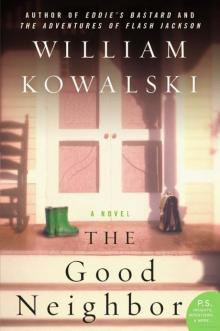 The Good Neighbor
The Good Neighbor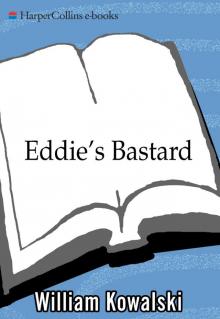 Eddie's Bastard
Eddie's Bastard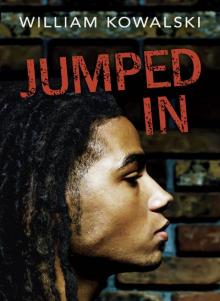 Jumped In
Jumped In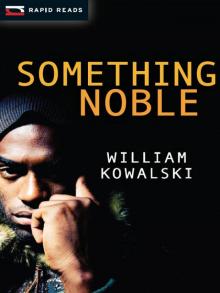 Something Noble
Something Noble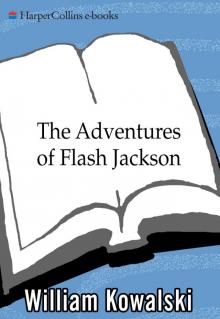 The Adventures of Flash Jackson
The Adventures of Flash Jackson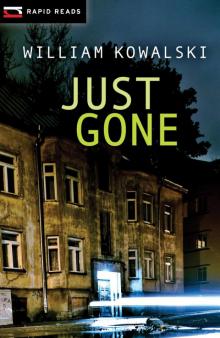 Just Gone
Just Gone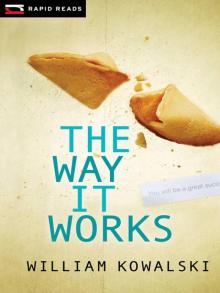 The Way It Works
The Way It Works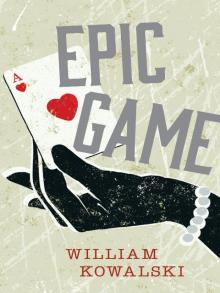 Epic Game
Epic Game